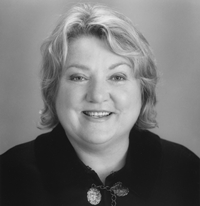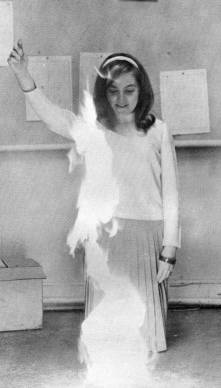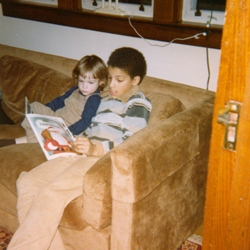Linda Gillingwater Rainsberry (BA’66): A Canadian Hero
 Though it had been a few years since they last saw each other, there was no mistaking the man who approached David Rainsberry at his mother’s January 2009 funeral: he was family.
Though it had been a few years since they last saw each other, there was no mistaking the man who approached David Rainsberry at his mother’s January 2009 funeral: he was family.
They weren’t really related. Rainsberry’s mother, Linda Marie Gillingwater (‘Gillibird’) Rainsberry (BA’66) had brought the man into her home while he was just a teenager. She knew he’d had a difficult upbringing, and was drinking. Without intervention, his prospects were bleak. She resolved to give him stability, support and a chance to follow his dreams. So for a while, he was part of the family.
“He was employed, married and looking forward to being a father,” says Rainsberry of the reunion. “He’d turned his life around with her help. Taking him in was an extraordinary step for a single mother already raising two kids and wondering how she was going to make mortgage payments. The moment he came into our lives I became aware of her dedication to making a difference.”
Demanding change
If anyone could make a difference in this world, it was Linda. Though she held many titles over the years – writer, director, producer, and educator – she was, at heart, an agent of change. Every project she took on, every position she filled, every television program she shepherded from concept to screen was intended to help people overcome challenges, build skills and realize their dreams. It wasn’t always an easy path monetarily, but it was a rewarding one because her work touched the lives of thousands of students, families and television viewers across North America. She was, to quote an article in Maclean’s, a Canadian hero.
Every hero has an origin story; Linda’s began in Saint John, New Brunswick, where she was born. Her father was perhaps the first person to shape her destiny. He had fought in World War II, and though he didn’t talk about his experiences much, Linda understood and appreciated the sacrifice he had made for his country. She began to think about what she could do to make the world a better place.
 By the time Linda enrolled at Dalhousie, her family was living in Halifax. She entered the university in the 1960s – a time of great social upheaval. Spurred by war, racial and sexual inequality, oppression and other injustices, young people all over the world were becoming politically active to an unprecedented degree and demanding widespread change. Linda was excited by the possibilities, as were her fellow students. One friend, Robin Pacific (BA ‘67), recalls working with Linda at the Dalhousie Gazette; Linda was the features editor and Pacific was the news editor.
By the time Linda enrolled at Dalhousie, her family was living in Halifax. She entered the university in the 1960s – a time of great social upheaval. Spurred by war, racial and sexual inequality, oppression and other injustices, young people all over the world were becoming politically active to an unprecedented degree and demanding widespread change. Linda was excited by the possibilities, as were her fellow students. One friend, Robin Pacific (BA ‘67), recalls working with Linda at the Dalhousie Gazette; Linda was the features editor and Pacific was the news editor.
“She was smart, funny and superbly sassy. Professors deferred to her and other students looked up to her. I remember her mother telling me that every night after supper Linda would go upstairs and study until eleven, and then come downstairs to watch the news. She was very aware of current events, of everything going on in the country, the city and of course the campus.”
Says Christopher Wilson, her oldest son: “Her time at Dalhousie was significant in that it defined her and her beliefs. The changes that were taking place in the world inspired her and her friends to become social justice advocates, to be part of that change.”
Finding ways to educate
Linda went on to earn her Bachelor of Education at the University of Toronto and she became a high school teacher in Etobicoke. She continued her studies while raising a family and eventually became involved with TVOntario, a public education broadcaster. Influenced by Fred Rainsberry, David’s grandfather and the man who had run the Children’s Television Department of the CBC, Linda began to explore the medium of television as a means of education. Many award-winning programs followed, including Hooked on Reading, which encouraged parents to read to their children, and Saying Goodbye, a 10-part documentary series on grief and bereavement.
Saying Goodbye would prove to be her last television production. Linda, who lived with a degenerative heart condition, suffered a massive heart attack. Says Wilson: “She had envisioned making another film and had finished a script, but realized the effort to fund and produce it would take a serious toll on her health. She went back to teaching and did it in a way where she could make a difference.”
 Linda became a team leader and consultant at Toronto Western Commercial and Technical School, working with inner city adolescents who had low literacy levels and were deemed too dysfunctional for regular classrooms. She then managed the Toronto Board of Education’s Ambassador Program, which engaged young adults living on the streets and struggling with drug and alcohol use. It was her involvement in the program that led Maclean’s to call her a hero. It also led Linda to New York where she created the Family Learning Circle initiative in 1998. Set in the Bronx, it was a three-site adult education school serving 1,000 African-American and Latina women annually.
Linda became a team leader and consultant at Toronto Western Commercial and Technical School, working with inner city adolescents who had low literacy levels and were deemed too dysfunctional for regular classrooms. She then managed the Toronto Board of Education’s Ambassador Program, which engaged young adults living on the streets and struggling with drug and alcohol use. It was her involvement in the program that led Maclean’s to call her a hero. It also led Linda to New York where she created the Family Learning Circle initiative in 1998. Set in the Bronx, it was a three-site adult education school serving 1,000 African-American and Latina women annually.
“I remember going to visit her to see what she was doing,” says Rainsberry. “She had created this oasis in the middle of overwhelming poverty where learning could thrive and give people a chance to succeed.”
The Linda Marie Gillingwater Rainsberry Graduate Scholarship and Bursary
Promoting literacy, exploring grief, connecting people with opportunities to learn – Linda accomplished many great things during her lifetime, but there was one dream she was unable to realize: a scholarship fund at Dalhousie to assist single mothers intent on earning a degree and making a difference. Linda didn’t have the funds to make it happen. Inspired by their mother, Wilson and Rainsberry stepped up to fulfill that dream in a way she couldn’t possibly have imagined with The Linda Marie Gillingwater Rainsberry Graduate Scholarship and Bursary. The endowment fund offers an annual bursary and scholarship totaling between $3,000-$4,000 with preference given to single mothers whose area of study is in the Faculty of Arts and Social Science; whose research incorporates a social justice analysis; and to students whose research is on women’s studies.
“Mom’s work was often about challenging conventional wisdom, such as the fact that you could use television to encourage people to read to their children,” says Rainsberry. “This fund challenges societal norms about where money goes – typically to business and law students. It will help facilitate change in social justice and that’s what we love about it.”
Hilda Nanning (MSW ‘12), a BC-based social worker, therapist and social justice professional, says it was a great honour to receive assistance through the fund. “It’s more than monetary support; it’s a validation of this field, of the plight of women and single mothers like myself. It’s an affirmation that our work matters and receiving it has great meaning for me.”
The fund would no doubt mean a lot to Linda, who saw herself as a secret agent, someone sent to inspire a new generation of women to be agents of revolution. She never wavered in that commitment, and never backed down.
“She had this poster with icons of the women’s rights movement, the labour movement, advocates for the differently abled,” recalls Wilson. “It had a quote from Dante Alighieri: ‘The hottest places in hell are reserved for those who, in a time of moral crisis, remain neutral.’ You only have a limited time on this earth and she used hers to make a difference.”
Continues Wilson: “She had no trouble speaking her mind to those who would oppress others, or to engage those who stood on the sidelines. She was always a teacher, and always motivating people to be agents of change in the world.”
Thanks to the generosity of her sons, she still is.